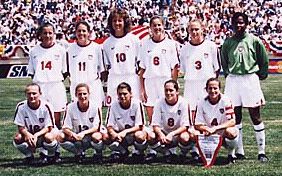 |


|
|
|
|
By Jack Nichols
 The U.S. women's team—in the shadow of California's San Gabriel Mountains, brought home soccer's most prestigious trophy under the gaze of the largest crowd ever to see a women's game. The team won over China with a hair's breadth kick delivered by Brandi Chastain. Ms. Chastain fell to her knees and removed her jersey. Her teammates rushed forward and surrounded her. A deafening but ecstatic roar rose from nearly 100,000 Rose Bowl fans that included President Clinton. Chastain had earlier posed for Gear Magazine with nothing but a soccer ball hiding her nakedness. Now, she flashed a black sports bra as she and her teammates celebrated on the field. The President became the butt of friendly jokes when it became known that he'd visited both the winning and losing women in their locker rooms. But he knew, he told the media, that this special game was undoubtedly an event that would shape the future of sports in the next century.
"I just put it home," she exulted. The final score—which she effected-- found the U.S. women's team winning by a single point—5 to 4. One-hundred million Chinese, the number estimated to be watching on TV, seemed to take their team's loss in stride. A Chinese girl good-naturedly told TV cameras that in spite of the U.S. win she still considered China's women's team the best. Enthusiasm for soccer is identified in America as primarily the province of "Soccer Mom's". In the rest of the world soccer is called "football"—because, in fact, that it precisely what it is. There is no contact between upper parts of the player's torso as in American football, a game which is, to put it mildly, pushy.
The President's perspective, that this U.S. women's win would—in the future—be regarded as a turning point, is a reminder of another U.S. president's sports concerns nearly a century ago. Theodore Roosevelt had succumbed to official sportsmen's pressures and, although he'd been ready to outlaw U.S.football on the ground that it was too violent, he compromised and allowed the introduction of the "forward pass". This maneuver would cut down, football's defenders argued, on playing field injuries. Now, at the turn of another century--another U.S. president is rightfully praising a game that has remained less celebrated in the American expeience. To promote it, he knows, makes America a part of our larger world. Soccer, on a world scale, is the Earth's favorite game. With its non-violent playing tactics— soccer has, with U.S. women winning, come of age. Football, with its "kill 'em, maim 'em" mentality will, hopefully, someday be seen as the cultural drawback that it is, a game sanctioning violent maneuvers against opposing teams. Some psychologists argue that U.S. football's violence provides an outlet for inherently violent Impulses common to the spectators. There is another view, however, one that may help account for the violence rampant in U.S. neighborhoods. This view calls attention to imitative reactions: human see, human do. Watching the trampling of opponents on the playing field, it says, spectators may be just as likely to trample fellows in venues outside sports arenas.
President Clinton said: "I think the whole country was caught up in this, not only fans of soccer but young girls…In some ways, it's the biggest sporting event of the last decade. It's new and exciting for the United States. It will have a very far-reaching impact, not only for the United States, but for the world." |

© 1997-99 BEI
 Brandi Chastain
Brandi Chastain  Briana Scurry
Briana Scurry